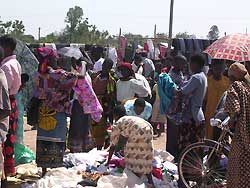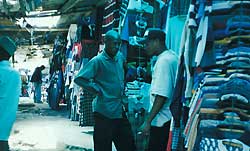| Period: 5 October 2003 - 25 July 2004. Country: Tanzania |
|
(1) Study on the Transformation of the Urban Small-Scale Commercial Sector after Economic Liberalization in Tanzania |
| OGAWA Sayaka (Division of African Area Studies) |
| Key Words: Business Customs, Apparel Marketing, Commercial Network, Local Socio-Economic Transformation, Mwanza |

Market day in the village |

Traders selling at stalls in the secondhand clothing market of Mwanza City |
(2) The purpose of my doctoral thesis is to shed light on how local economic practices and norms have been changed or maintained under the influence of changes in the global market and local socio-economic transformation.
In the second-hand clothing trade in Mwanza, Tanzania, there are three types of traders: wholesalers, middlemen and retailers. A form of sale on credit has prevailed between middlemen, who have large capital, and retailers, who do not. This business practice is based on horizontal social relationships and reciprocal norms. In these transactions, there are social solidarities that reduce the negative impacts of credit defaults, as well as urban norms like “ujanja(“cunning” in Swahili language)”. The traders have developed efficient marketing systems for second-hand clothes through this form of sale on credit. I will discuss the networking and entrepreneurship of urban small-scale traders by elucidating this marketing system.
(3) From October 7, 2003 to July 25, 2004, I conducted my fieldwork at the second-hand clothing market and periodic markets in the Mwanza Region. The objective of this research was to investigate: (1) The origin and transformation of sales on credit, and (2) variations in business customs conducted by small-scale trader under the influence of political change.
- Interviews with 272 traders make it clear that there have been four periods of second hand clothing trade, corresponding to policy changes. In the first period (late 1970’s-1985), second-hand clothes were only available through smuggling. In the second period (1986-1995), uncontrolled free trade emerged under the economic liberalization policy of the second president. The third period (1996-2003) saw rather adverse conditions introduced by the regime of the third president. In the latest period (Oct. 2003-), commercial activities on streets, including part of the second-hand clothing trade, were banned by municipal authorities. This classification according to policy changes parallels the changes in business practices that have been investigated in precious fieldworks. Therefore, the existing business customs, including reciprocal norms, are not “traditional” business customs. Rather, they have been created by traders to respond to local socio-economic changes.
- If we classify the traders according to the time they entered the business, we find that there are four “generations”. The “generations” emerged in a way that matches the periods in policy changes mentioned above. There are several combination patterns among the traders belonging to the different generations. Each combination pattern has a different choice of transaction partners and business customs, as well as its own urban norms, called “ujanja”. Therefore, each “generation” negotiates with the others according to its own urban norms, leading to the creation of new business customs. The existing generations and new generations have modified newly created business customs into new forms.
In the future, I will elucidate the entrepreneurship and commercial networks of the urban small-scale commercial sector by examining external factor such as socio-economic transformation in Mwanza and internal factor such as the cognition of each trader that made change their business practice.
|


 21st Century COE Program
-Aiming for COE of Integrated Area Studies-
21st Century COE Program
-Aiming for COE of Integrated Area Studies-